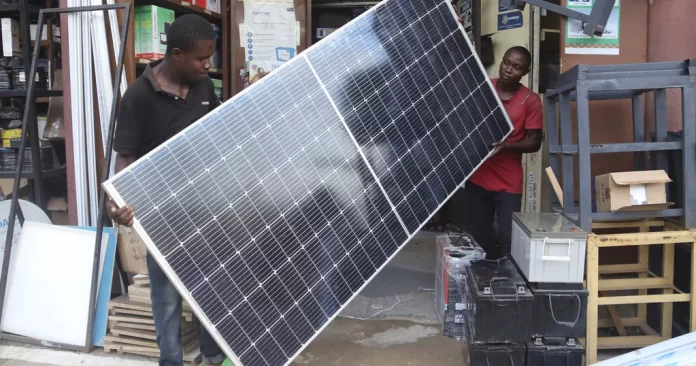Ending Nigeria’s fuel subsidy pushes a shift to solar power, it began to rain as soon as Bridget Mosanya reached into her bag for a book to study. Even though it is only lightly raining, the power immediately went out, as it almost always does in Nigeria.
The teen said, standing in her now-dark room, “Nepa has taken light.” She was referring to the national electric power authority, a long-gone public utility whose abbreviation is still frequently used to refer to the sporadic power supply from Nigeria’s frail electrical grid.
The family’s small solar system was turned on by her father, Tunde Mosanya, lighting the living room, the master bedroom, and his daughter’s room. Bridget had enough time to complete her studying that evening.
Bamkinaan Panshak, 13, would have to wait until the power was restored or use his parents’ partially charged cellphone flashlight to complete his homework across the street on the east side of Nigeria’s capital city of Abuja.
Because they don’t have a solar system, his family used to turn on their gasoline-powered backup generator during blackouts. However, they are unable to afford the cost of fuel because the new president Bola Tinubu removed a subsidy that helped to lower the price of gas.
The teacher father of Bamkinaan, Guleng Panshak, said, “It is just beyond means at the moment.”.
Operators claim that since the long-running fuel subsidy ended last month, interest in solar has increased, which could hasten the continent’s largest economy’s progress in mitigating climate change. To make the most of this new opportunity to advance Nigeria’s climate goals, including eliminating the widely used fossil fuel-powered generators that keep the lights on in homes and businesses, experts advise the government to have a clear plan in place.
Fuel cost reduction was a well-liked, but expensive from an economic and environmental standpoint, system.
Nigeria spent $9.7 billion ($4.39 trillion) on the subsidy, according to the state-owned oil company NNPC, leaving the government unable to fund infrastructure projects, such as rail systems that could lower vehicle emissions.
In a nation where only half of its more than 200 million citizens have access to grid electricity, gas-powered generators have proliferated due to subsidies and contribute significantly to emissions. When they do, blackouts frequently occur.
According to a 2022 study by Boston Consulting Group and all on, solar adoption has, on the other hand, been largely constrained by relatively high upfront costs, with only 1.25 percent of Nigerian households installing those systems.
According to the study, household emissions would be reduced by 30% if 30% of Nigerian households switched to solar power by 2030, preventing 5 million metric tons of carbon dioxide from being produced.
The newly elected president acknowledged that ending the fuel subsidy “will impose an additional burden on the masses of our people,” who have already been suffering from high inflation and unemployment while having to pay triple the price of gasoline.
It is a problem with potential long-term climate benefits.
Segun Adaju, president of the Nigerian Association for renewable energy, stated, “We are already receiving a lot of customer inquiries and requests for solar.” “Many prospective customers have already placed orders for solar systems.”
Adaju added that this is a great chance to reduce emissions by switching to solar and electric vehicles and reducing the use of fossil fuels.
Mosanya, Bridget’s father, wants to completely cut out gasoline and use solar power for all of their appliances, including refrigerators, air conditioners, and televisions, in the event of a power outage.
Energy engineer Kunle Adesiyan from Lagos claims that a larger 4-kilowatt solar array could be installed for “conservatively” 3 million naira ($6,452) and would be sufficient to meet Mosanya’s needs.
Most families and small businesses cannot afford that price.
According to energy economist Tobi Oluwatola, any potential environmental advantages of eliminating the fuel subsidy would be lost in the absence of a thorough plan to increase the affordability and accessibility of renewable energy.
He suggested providing financial incentives for solar users and companies that install solar panels, such as tax credits and low-interest loans.
Nigeria must also put its net metering policy into practice to allow solar owners to sell extra power to the grid during the day and lower their net electricity costs. In Abuja, Oluwatola, CEO of Tao Energy, stated that this would lessen the need for battery storage.













